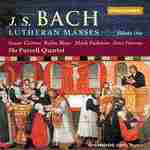
Lutheran Masses, Vol 1 (BWV234 & 235)
 $28.00
Out of Stock
$28.00
Out of Stock2-6 weeks add to cart
J.S. BACH
Lutheran Masses, Vol 1 (BWV234 & 235)
Susan Gritton (sop) Robin Blaze (alto) Mark Padmore (ten) Brian Harvey, Peter Harvey (basses); Purcell Quartet
[ Chandos / CD ]
Release Date: Saturday 1 May 1999
This item is currently out of stock. We expect to be able to supply it to you within 2 - 6 weeks from when you place your order.
"Occasionally the undirected ensemble needs drawing together and the odd blip springs up, but these are fresh, characterful (the oboe and flute playing is occasionally quirky but musically affecting) and spontaneous Bach performances which will uplift and delight in equal measure."
(Gramophone)
"Bach's Lutheran Masses have long been regarded as illegitimate cousins of the sui generis B minor Mass, as short and perfunctory offerings which pale by comparison. Quite why these beautiful and meticulously crafted works should also be patronized on account of Bach's almost wholesale refit from his cantata oeuvre is a mystery, especially since the quality of Bach's parodies from a German liturgical context to the Latin Ordinary is nothing but virtuosic - as indeed it is in the B minor Mass. Composing Mass settings in Bach's Leipzig hardly constituted clandestine Catholic recusancy, since they formed an accepted, if occasional part of the Lutheran liturgy, especially in the 1730s and 1740s when Masses became an increasingly fashionable genre, irrespective of denomination. Bach engaged on a series of four such works in the late 1730s, though it is still unknown whether they were commissioned by a patron or maybe formulated as 'tokens of Bach's assiduity' for the Dresden court, as Spitta asserted. They could as easily have been written for use in Leipzig where opportunities would have regularly presented themselves for concerted performance. After all, Latin text settings enjoy a degree of flexibility since, unlike many cantatas, they are not specifically linked to the church calendar.
This first volume of the Masses from the Purcell Quartet and friends contains two well-contrasted works. The G minor is drawn exclusively from cantata movements written in the 1720s as part of the cantata cycles which occupied Bach between 1723 and1727, No. 187 being the mainstay. The A major Mass is an altogether more ambitious transformation, exemplified in the remarkable setting of the Gloria where Bach unashamedly reconditions the highly rhetorical original of Cantata No. 67; this is an instance where the original cantata text - conveying the ambiguity of faith and doubt - redeploys the dramatic 'Vox Christi' original into a brilliantly contrasted abstraction. Pragmatic maybe, but Bach knew when he had a good idea and when theatricality (popular in the opera-crazy environs of Dresden) might win him friends. These performances are small-scale but big-hearted. If they do not quite grip the listener as Herreweghe or Schreier do in their respective versions (with either textural richness or rhythmic drive), the four single voices - used for both solos and chorus - are constantly full of ardour, eager to converse as chamber musicians, both with each other and with the instruments. In the G minor choruses, they rarely succumb to a type of consort anonymity where individual vocal timbre disappears into homogeneous 'beauty'. The ends of both the 'Gratias agimus' and the 'Cum Sancto Spiritu' from the A major work convey, respectively, a delicious Ramellian eloquence and fervent, almost-madrigalian palette.
Occasionally the undirected ensemble needs drawing together and the odd blip springs up, but these are fresh, characterful (the oboe and flute playing is occasionally quirky but musically affecting) and spontaneous Bach performances which will uplift and delight in equal measure."
(Gramophone - Jonathan Freeman-Attwood)
Tracks:
Mass,BWV234.
Mass,BWV235



